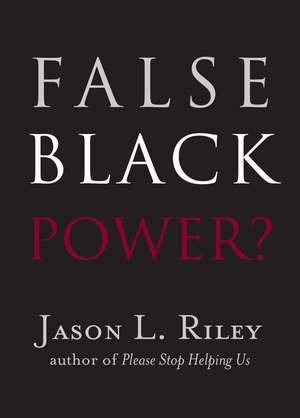False Black Power?: New Threats to Freedom Series
Autor Jason L. Riley Contribuţii de John McWhorter, Glenn C. Louryen Limba Engleză Paperback – 14 iun 2017
Black civil rights leaders have long supported ethnic identity politics and prioritized the integration of political institutions, and seldom has that strategy been questioned. In False Black Power?, Jason L. Riley takes an honest, factual look at why increased black political power has not paid off in the ways that civil rights leadership has promised.
Recent decades have witnessed a proliferation of black elected officials, culminating in the historic presidency of Barack Obama. However, racial gaps in employment, income, homeownership, academic achievement, and other measures not only continue but in some cases have even widened. While other racial and ethnic groups in America have made economic advancement a priority, the focus on political capital for blacks has been a disadvantage, blocking them from the fiscal capital that helped power upward mobility among other groups.
Riley explains why the political strategy of civil rights leaders has left so many blacks behind. The key to black economic advancement today is overcoming cultural handicaps, not attaining more political power. The book closes with thoughtful responses from key thought leaders Glenn Loury and John McWhorter.
Recent decades have witnessed a proliferation of black elected officials, culminating in the historic presidency of Barack Obama. However, racial gaps in employment, income, homeownership, academic achievement, and other measures not only continue but in some cases have even widened. While other racial and ethnic groups in America have made economic advancement a priority, the focus on political capital for blacks has been a disadvantage, blocking them from the fiscal capital that helped power upward mobility among other groups.
Riley explains why the political strategy of civil rights leaders has left so many blacks behind. The key to black economic advancement today is overcoming cultural handicaps, not attaining more political power. The book closes with thoughtful responses from key thought leaders Glenn Loury and John McWhorter.
Preț: 81.85 lei
Nou
Puncte Express: 123
Preț estimativ în valută:
15.66€ • 16.26$ • 13.06£
15.66€ • 16.26$ • 13.06£
Carte disponibilă
Livrare economică 03-17 martie
Preluare comenzi: 021 569.72.76
Specificații
ISBN-13: 9781599475189
ISBN-10: 1599475189
Pagini: 128
Dimensiuni: 127 x 178 x 13 mm
Greutate: 0.14 kg
Ediția:First Edition, 1
Editura: Templeton Press
Colecția Templeton Press
Seria New Threats to Freedom Series
ISBN-10: 1599475189
Pagini: 128
Dimensiuni: 127 x 178 x 13 mm
Greutate: 0.14 kg
Ediția:First Edition, 1
Editura: Templeton Press
Colecția Templeton Press
Seria New Threats to Freedom Series
Notă biografică
Jason L. Riley is a senior fellow at the Manhattan Institute, a columnist for the Wall Street Journal, and a commentator for Fox News. He lives in suburban New York City with his wife and three children.
Glenn C. Loury is the Merton P. Stoltz Professor of the Social Sciences and professor of economics at Brown University. His books include One by One from the Inside Out: Essays and Reviews on Race and Responsibility in America; The Anatomy of Racial Inequality; and Race, Incarceration, and American Values. Among other honors, he has been elected a distinguished fellow of the American Economic Association, a fellow of the Econometric Society, a member of the American Philosophical Society, and a member of the U.S. Council on Foreign Relations.
John McWhorter is an associate professor of English and Comparative Literature at Columbia University. He is the author of The Power of Babel, Doing Our Own Thing, Our Magnificent Bastard Tongue, The Language Hoax, Words on the Move, and, most recently, Talking Back, Talking Black. He is a regular columnist on language matters and race issues for Time and CNN and writes for the Wall Street Journal Taste page. McWhorter also writes a regular column on language for the Atlantic and hosts the Lexicon Valley podcast at Slate.
Glenn C. Loury is the Merton P. Stoltz Professor of the Social Sciences and professor of economics at Brown University. His books include One by One from the Inside Out: Essays and Reviews on Race and Responsibility in America; The Anatomy of Racial Inequality; and Race, Incarceration, and American Values. Among other honors, he has been elected a distinguished fellow of the American Economic Association, a fellow of the Econometric Society, a member of the American Philosophical Society, and a member of the U.S. Council on Foreign Relations.
John McWhorter is an associate professor of English and Comparative Literature at Columbia University. He is the author of The Power of Babel, Doing Our Own Thing, Our Magnificent Bastard Tongue, The Language Hoax, Words on the Move, and, most recently, Talking Back, Talking Black. He is a regular columnist on language matters and race issues for Time and CNN and writes for the Wall Street Journal Taste page. McWhorter also writes a regular column on language for the Atlantic and hosts the Lexicon Valley podcast at Slate.
Cuprins
Introduction / 3
Part 1: False Black Power
1: The Civil Rights Distraction / 11
2: The Limits of Politics / 31
3: False Black Power / 51
Part 2: Dissenting Points of View
4: Keeping Up With the Leftists
New Observations for Variations on the Theme
by John McWhorter / 87
5: Black America
Changing Rhetoric into Remedies
by Glenn C. Loury / 95
6: A Response to McWhorter and Loury / 105
Notes / 109
About the Contributors / 121
Part 1: False Black Power
1: The Civil Rights Distraction / 11
2: The Limits of Politics / 31
3: False Black Power / 51
Part 2: Dissenting Points of View
4: Keeping Up With the Leftists
New Observations for Variations on the Theme
by John McWhorter / 87
5: Black America
Changing Rhetoric into Remedies
by Glenn C. Loury / 95
6: A Response to McWhorter and Loury / 105
Notes / 109
About the Contributors / 121
Recenzii
“What makes this book shine is the clarity of its logic and accessibility of its writing style. In a short book, Riley makes his case powerfully. . . . He also had the guts to include critiques from two leading black intellectuals, John McWhorter and Glenn Loury, and his response. This is a man to respect because he is after the truth and results, not cheap points.” —Thomas Lifson, American thinker
“I have just finished reading part I of Jason Riley’s new book False Black Power?, which NRO is excerpting today, and I want to recommend it right away as highly as I can” —Roger Clegg, National Review
"The thrust of his slim but significant new book, False Black Power?, from Templeton Press, is the politically incorrect conclusion that black “political clout is no substitute for self-development." —Mark Tapson, Front Page Mag
“I have just finished reading part I of Jason Riley’s new book False Black Power?, which NRO is excerpting today, and I want to recommend it right away as highly as I can” —Roger Clegg, National Review
"The thrust of his slim but significant new book, False Black Power?, from Templeton Press, is the politically incorrect conclusion that black “political clout is no substitute for self-development." —Mark Tapson, Front Page Mag
Descriere
Black civil rights leaders have long supported ethnic identity politics and prioritized the integration of political institutions, and seldom has that strategy been questioned. In False Black Power?, Jason L. Riley takes an honest, factual look at why increased black political power has not paid off in the ways that civil rights leadership has promised.






















